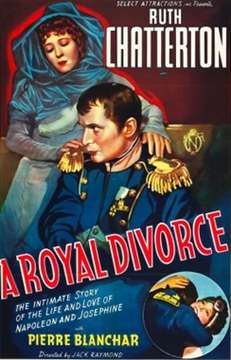| A Royal Divorce | |
|---|---|
 | |
| Directed by | Jack Raymond |
| Written by | Miles Malleson Jacques Théry |
| Produced by | Herbert Wilcox |
| Starring | Ruth Chatterton Pierre Blanchar Carol Goodner |
| Cinematography | Freddie Young |
| Edited by | Peggy Hennessey |
| Music by | Anthony Collins |
Production company | Imperator Films |
| Distributed by | Paramount British Pictures |
Release date |
|
Running time | 85 minutes |
| Country | United Kingdom |
| Language | English |
A Royal Divorce is a 1938 British historical drama film directed by Jack Raymond and starring Ruth Chatterton, Pierre Blanchar and Frank Cellier. [1] The film portrays the complex relationship between Napoleon I of France and his wife, Josephine Bonaparte from their first meeting until their divorce more than a decade later. [2] It was shot at Denham Studios in Buckinghamshire. [3] The film's sets were designed by the art director David Rawnsley.